7C2 Mathematics
Section outline
-
-
Strand: Number & Algebra (number knowledge)
Basic Facts L2/3 Know basic addition, subtraction, multiplication and division facts.
Rounding L3/4 Round numbers to different place values, both whole and decimal numbers.
Prime Number L4/5 Explore factors of numbers by investigating rectangular (composite)
numbers and line (prime) numbers.
-
Strand: Number & Algebra (number strategies for addition & subtraction, directed number operations)
Add/Sub L3 Use a range of number strategies to solve add/sub problems with integers and decimals.
Integers L4 Know the relative size and place value of positive and negative integers.
Strand: Measurement (metric unit conversion, distance/time/speed)
Linear Scales L3 Use linear scales and whole numbers of metric units for length (distance), time, speed.
Unit Conversion L4 Convert between metric units, using whole numbers and decimals.
-
-
EXPLORE / TŪHURA learning intentions:
- We are EXPLORING numbers and operations so that we connect numbers to daily life, objects and incidents
- We are EXPLORING place value so that we can conceptualise number in a meaningful way
- We are EXPLORING the difference between digits and numbers so that we classify them
- We are EXPLORING numbers and operations so that we can recognise the practical application of number and number sense
Kia Ora and Good Morning...
Welcome to MHJC – Coast Whanau.
I am Mr Choong, your Maths teacher and we are going to learn and do all the fun stuff in Mathematics.
Remember: Success = daily practice in maths.
Daily means 20-30 mins every day! That's it! Maths Buddy is an online maths program to help you. If you can do Maths Buddy every day for 20 mins or more, it's done. Maths Buddy is great because you will have a video to demonstrate how the maths is done for each problem. So, you have a teacher to help you at any time. Remember I see you only twice a week, but maths must be done every day. That's why Maths Buddy is so important.
You can use your MHOL login name and password to log in to Maths Buddy
We will be learning about numbers and operations this term. Our Whanau context for this term is Our Place & Celebrations. We will learn how to link and apply what we learn this term to our context.
We are going to start this week by revising our number operation skills and memorising the 1-12 times table. We will draw the times table grid in our books and fill it.
After you fill the grid you may need to practice number operations using the following link:
https://www.mathplayground.com/grade_3_games.html
-
Kia ora..
We will be learning about numbers and operations this term. Our Whanau context for this term is the evolving community and we will link what we learn to the context by learning how might we use numbers in our community.
We will start by revising place value and rounding numbers.
EXPLORE / TŪHURA
Learning Intentions:
- We are EXPLORING numbers and operations so that we connect numbers to daily life, objects and incidents
- We are EXPLORING place value so that we can conceptualise number in a meaningful way
- We are EXPLORING the difference between digits and numbers so that we classify them
- We are EXPLORING numbers and operations o that we can recognise the practical application of number and number sense

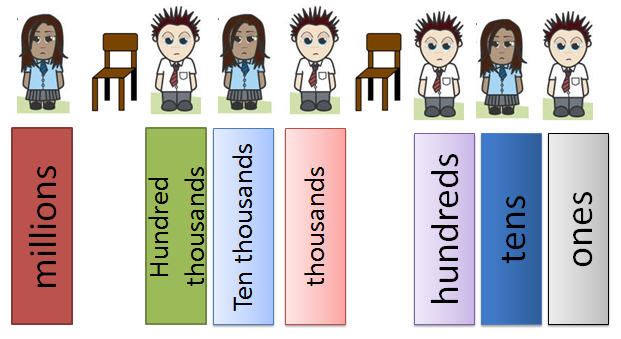
Context:
- Me, Myself, and Us

MHJC Learning Framework Step:
- Explore (Setting the scene)
Activities:
- Mind mapping of Mathematics in relation to the world
- History background of our based-10 (decimal) number system.
- Reading and understanding whole numbers.
Learning Intentions: We are learning to (WALT)...
- brainstorm existing ideas of mathematics learnt over the years
- challenge ourselves to link everything in the world to math
- explore the origin and background story of our number system, i.e. the logic behind our current Arabic numerals
- explain the meaning of digits in any whole number
- revise the place value
- explore numbers
- make sensible estimates and check the reasonability of answers
Success Criteria: I can/have...
- explore the place value system and the value of digits
- understand estimation using rounding
- understand numbers on a number line including the place of fractional numbers
Resources:
MHOL, Reading and understanding whole numbersWhy is Math important?
Arabic Numerals.
-
Good Morning...
Welcome to week 3. This week we will be sitting our first Maths eAsTTle test. Then we will be learning about rounding numbers.


Context:

MHJC Learning Framework Step:
EXPLORE / TŪHURA
Learning Intentions:
- We are EXPLORING numbers and operations so that we connect numbers to daily life, objects and incidents
- We are EXPLORING place value so that we can conceptualise number in a meaningful way
- We are EXPLORING the difference between digits and numbers so that we classify them
- We are EXPLORING numbers and operations o that we can recognise the practical application of number and number sense
Activities:
Work on the documents from last week. Attempt the rounding numbers question.
Learning Intentions: We are learning to (WALT)...
- explain the meaning of digits in any
whole number. - revise the place value.
- use place value concept in rounding numbers.
- explore numbers.
- make sensible estimates and check the
reasonableness of answers.
Success Criteria: I can/have...- explored the place value system and the value of digits.
- estimated answers using rounding
- used place value concept in rounding numbers
Resources:
MHOL, external websites
Homework:
MathsBuddy to be completed by Sunday night each week.
-
Context:

- Year 7 Camp Preparation Week (expect interruption)
- Maths groups (Shapes) established after assessment analysis
MHJC Learning Framework Step:
FOCUS / ARONGA
Learning Intentions:
- We are FOCUSING on rounding numbers to different place values so that we can develop an understanding and confidence that in rounding whole numbers.
- We are FOCUSING on multiples and factors that we can identify the factors of a whole number
- We are FOCUSING on divisibility so that we can identify the possible factors of a whole number easily and confidently
Learning Intentions: We are learning to (WALT)...
- identify the place value of digits in any
whole number up to million - revise the place value
- use place value concept in rounding numbers
- explore numbers
- make sensible estimates and check the
reasonableness of answers - use times table facts to work out the multiples and factors of a number
Success Criteria: I can/have...
- explored the place value system and the value of digits.
- estimated answers using rounding
- used place value concept in rounding numbers
- work out the factors of a whole number
Activities:
- Catch up & review work on the documents from last week. Attempt naming the whole number place value up to millions
- Quiz on Prime Number (in class); review this to consolidate understanding
- Complete the Prime Number Worksheet
- Watch these video resources (optional)
Resources:
- MHOL, external websites
Homework:
- MathsBuddy to be completed by Sunday night each week.
- Review or catch up with unfinished class learning tasks.
-
Context:

- Year 7 Camp Preparation Week (expect interruption)
- Lockdown Level 3, distant learning from home
MHJC Learning Framework Step:
FOCUS / ARONGA
Learning Intentions:
- We are FOCUSING on basic addition and subtraction strategies so that we can develop our confidence and skills in adding and subtracting numbers up to 7-digits, including subtraction from 10-thousands.
- We are FOCUSING on rounding numbers so that we can identify the place value of whole number and round the numbers to a specific place value correctly.
- We are FOCUSING on estimation so that we can develop our confidence and skills in estimating numbers by rounding off.
- We are FOCUSING on tidy numbers so that we can identify the complementary number that adds up to 100, with quick and accurate recall.
Success Criteria: I can/have...
- explored the place value system and the value of digits.
- estimated answers using rounding
- used place value concept in rounding numbers
- work out the number pairs that make up 100, quickly and confidently
Activities:
- Catch up & review work on the documents from last week. Attempt naming the whole number place value up to millions
- Hands-Activity: Make 100
- Watch these video resources (optional)
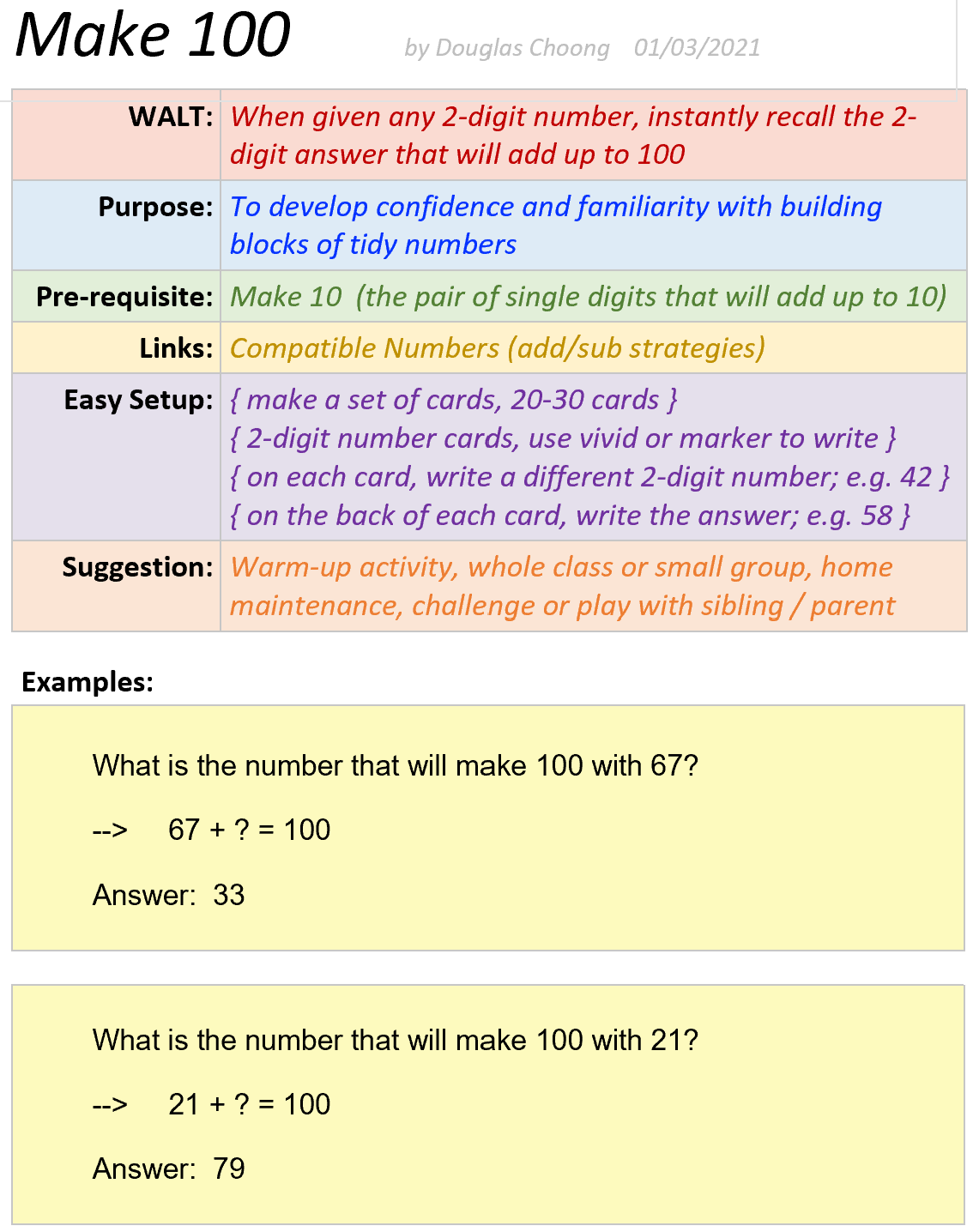
Resources:
- MHOL, external websites
Homework:
- MathsBuddy to be completed by Sunday night each week.
- Review or catch up with unfinished class learning tasks.
-
Context:

- We are FOCUSING on prime numbers so that we can develop an understanding that prime numbers are the building blocks of all numbers
- We are FOCUSING on multiplicative skills os that we can identify the factors of a number
- We are FOCUSING on composite numbers so that we can identify the difference between these and prime numbers
- identify the place value of digits in any
whole number up to million - revise the place value
- use place value concept in rounding numbers
- explore numbers.
- make sensible estimates and check the
reasonableness of answers. - explored the place value system and the value of digits.
- estimated answers using rounding
- used place value concept in rounding numbers
- Catch up & review work on the documents from last week. Attempt naming the whole number place value up to millions
- Quiz on Prime Number (in class); review this to consolidate understanding
- Complete the Prime Number Worksheet
- Watch these video resources (optional)
- MHOL, external websites
- MathsBuddy to be completed by Sunday night each week.
- Review or catch up with unfinished class learning tasks.
MHJC Learning Framework Step:
FOCUS / ARONGA
Learning Intentions:
Learning Intentions: We are learning to (WALT)...
Success Criteria: I can/have...
Activities:
Resources:
Homework:
-
Context:

MHJC Learning Framework Step:
PLAN & DO / WHAKAMAHI learning intentions:
- We are PLANNING to practise and produce factor trees so that we can factorise numbers using prime numbers
- We are PLANNING to practise and apply rounding number skills so that we can round numbers to the nearest place value for both whole and decimal numbers
- We are PLANNING to practise our basic facts so that we can promote speed and accuracy in our recall of our number basic facts
Learning Intentions: We are learning to (WALT)...
- use factor tree to work out the prime factorisation of composite numbers
- revise the place value
- use place value concept in rounding numbers, including rounding of decimal numbers
- explore decimal place values
- continue to practise our basic facts for accuracy and speed of recall
Success Criteria: I can/have...
- factorise composite numbers using prime factorisation and the factor tree method
- explored the decimal place value system
- used place value concept in rounding numbers, including decimal numbers
- round decimal numbers to the 1, 2 or 3 decimal places
Activities:
- Catch up & review work on the documents from last week.
- Complete the Prime Factorisation (Prime Factor Tree) Worksheets
- Watch video resources to consolidate understanding
Resources:
- MHOL, external websites
Homework:
- Worksheet/s and learning tasks assigned on Google Classroom
- Review or catch up with unfinished class learning tasks
-
Context:

MHJC Learning Framework Step:
PLAN & DO / WHAKAMAHI learning intentions:
- We are PLANNING to practise and produce factor trees so that we can factorise numbers using prime numbers
- We are PLANNING to practise and apply rounding number skills so that we can round numbers to the nearest place value for both whole and decimal numbers
- We are PLANNING to practise our basic facts so that we can promote speed and accuracy in our recall of our number basic facts
(Catch-up week due to interruptions from camp week and lockdown)
-
Context:

MHJC Learning Framework Step:
PLAN & DO / WHAKAMAHI learning intentions:
- We are PLANNING to apply prime number knowledge so that we can solve problems involving prime and composite numbers
- We are PLANNING to practise and produce factor trees so that we can factorise numbers using prime numbers
- We are PLANNING to practise and apply rounding number skills so that we can round numbers to the nearest place value for both whole and decimal numbers
- We are PLANNING to practise our basic facts so that we can promote speed and accuracy in our recall of our number basic facts
(Revision week for the term's overall learning)
-
Context:

MHJC Learning Framework Step:
REFLECT / WHAIWHAKAARO learning intentions:
- We are REFLECTING on our progress and gaps in order to review our knowledge and skills in rounding numbers effectively
- We are REFLECTING on how we are able to work out prime factorisation so that we can evaluate our understanding of prime numbers
- We are REFLECTING on our basic facts results so that we can continue to focus on our gaps and improve our speed and accuracy of recall
(Assessment Week)
-
Context:

MHJC Learning Framework Step:
REFLECT / WHAIWHAKAARO learning intentions:
- We are REFLECTING on our progress and gaps in order to review our knowledge and skills in rounding numbers effectively
- We are REFLECTING on how we are able to work out prime factorisation so that we can evaluate our understanding of prime numbers
- We are REFLECTING on our basic facts results so that we can continue to focus on our gaps and improve our speed and accuracy of recall
(Assessment catch-up and self-reflection)
-
Context: We Are Together.
FOCUS / ARONGA learning intentions:
- We are FOCUSING on prime numbers so that we can develop an understanding that prime numbers are the building blocks of all numbers
- We are FOCUSING on multiplicative skills so that we can identify the factors of a number
- We are FOCUSING on composite numbers so that we can identify the difference between these and prime numbers
-
Context:

MHJC Learning Framework Step:
EXPLORE / TŪHURA learning intentions:
- We are EXPLORING... to conceptualise a range of mental strategies to solve addition and subtraction problems.
- We are EXPLORING... to calculate with positive and negative integers.
Learning Intentions: We are learning to (WALT)...
- jump through a tidy number on a number line to solve problems like 17 + ? = 91
- solve problems like 23 + ? = 71 by jumping up by a tidy number on a number line, then jumping back a small number
- solve arithmetic problems following the order of operations (brackets, division, multiplication, addition/subtraction)
- solve directed number addition/subtraction problems that involves positive and negative integers
- continue to practise our basic facts for accuracy and speed of recall
Success Criteria: I can/have...
- use tidy-jump mental strategy to mentally solve addition and subtraction problems
- show the steps and working of the tidy-jump strategy to logically explain the mathematical process to the solution
- add and subtract positive and negative integers confidently and accurately
- show consistent progress or maintain the ability of basic facts' accuracy and speed of recall
Activities
- Catch up & review work on the documents from last term
- Complete the exercises assigned on Google Classroom
- Continual regular maintenance and practice of Basic Facts Practice on Ludi
- Quick 20 of Maths Starter questions as a warm-up routine
Resources:
- MHOL, external websites
- Google Classroom
- Maths Buddy
- Ludi Basic Facts
- Maths Starter
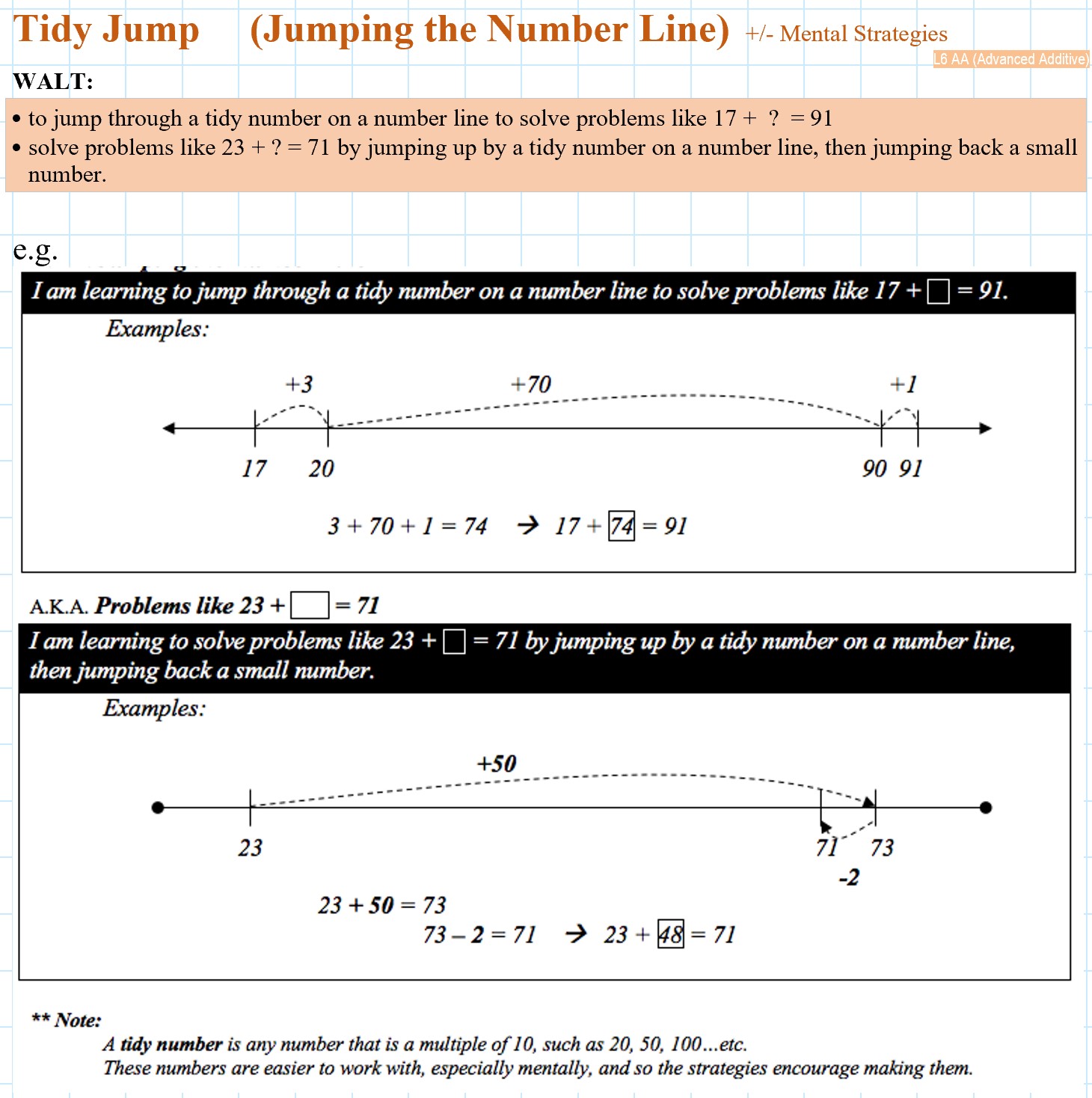
-
Context:

MHJC Learning Framework Step:
FOCUS / ARONGA learning intentions:
- We are FOCUSING... on a range of mental strategies to develop part-whole thinking skills in order to solve addition and subtraction problems.
- We are FOCUSING... on Tidy Jump mental strategy to develop the confidence and mental skills to solve addition and subtraction problems.
- We are FOCUSING... on Rounding & Compensation mental strategy to develop the confidence and mental skills to solve addition and subtraction problems.
- We are FOCUSING... on integers (positive and negative numbers) integers in order to solve directed numbers operations (add/subtract/multiply/divide).
Learning Intentions: We are learning to (WALT)...
- round up a number to a tidy number to make it easy to add or subtract
- compensate (put back or take away) the rounded-up amount
- solve arithmetic problems following the order of operations (brackets, division, multiplication, addition/subtraction)
- solve directed number multiplication/division problems that involves positive and negative integers
- continue to practise our basic facts for accuracy and speed of recall
Success Criteria: I can/have...
- use rounding-and-compensation mental strategy to mentally solve addition and subtraction problems
- show the steps and working of the rounding-and-compensation strategy to logically explain the mathematical process to the solution
- multiply and divide positive and negative integers confidently and accurately
- show consistent progress or maintain the ability of basic facts' accuracy and speed of recall
Activities
- Catch up & review work on the assigned exercises from last week
- Complete the exercises assigned on Google Classroom
- Continual regular maintenance and practice of Basic Facts Practice on Ludi
- Quick 20 of Maths Starter questions as a warm-up routine
Resources:
- MHOL, external websites
- Google Classroom
- Maths Buddy
- Ludi Basic Facts
- Maths Starter
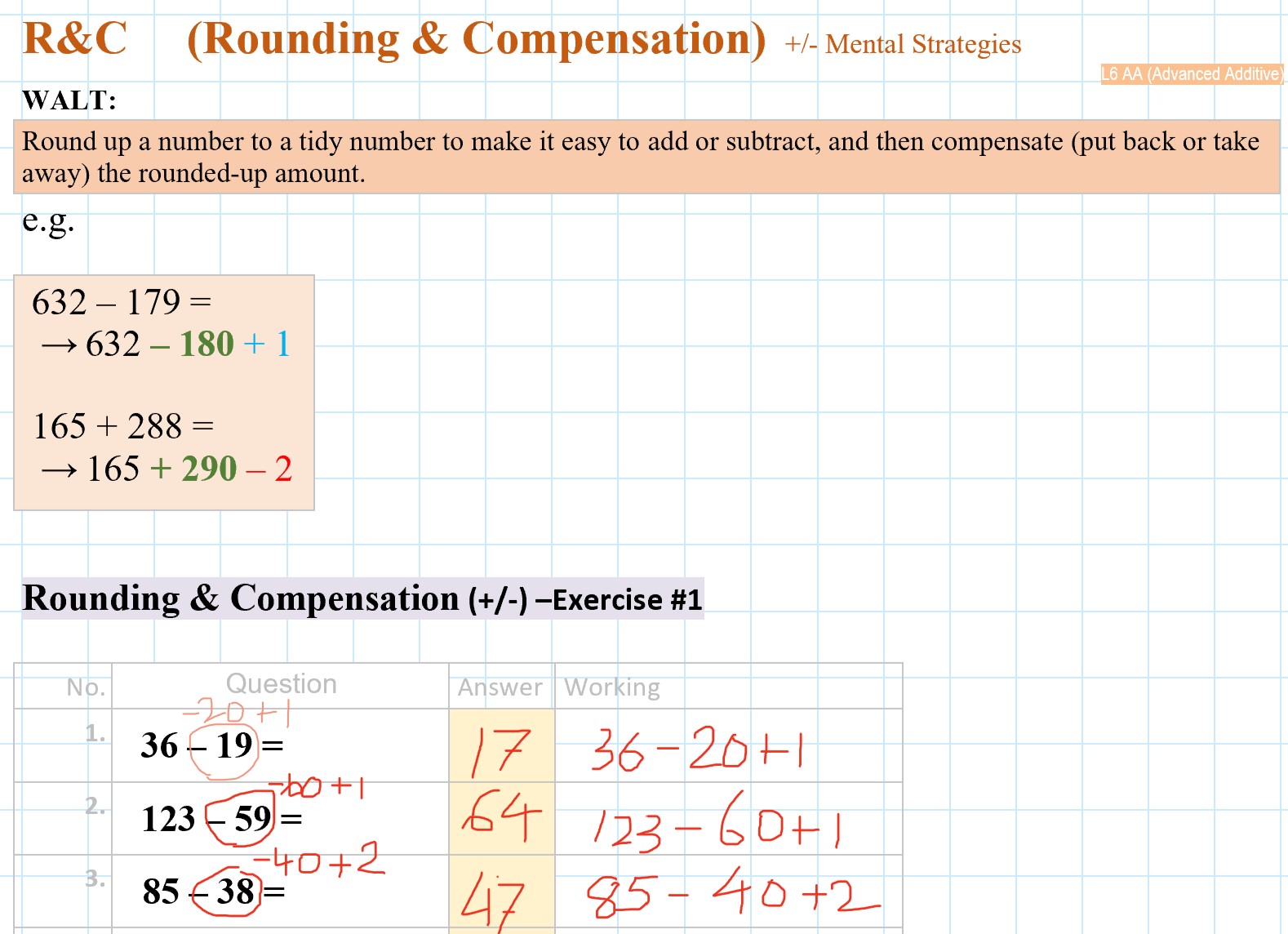
-
Context:

MHJC Learning Framework Step:
FOCUS / ARONGA learning intentions:
- We are FOCUSING... on a range of mental strategies to develop part-whole thinking skills in order to solve addition and subtraction problems.
- We are FOCUSING... on Compatible Numbers mental strategy to develop the confidence and mental skills to solve addition and subtraction problems.
- We are FOCUSING... on integers (positive and negative numbers) integers in order to solve directed numbers operations (add/subtract/multiply/divide).
Learning Intentions: We are learning to (WALT)...
- use compatible numbers to solve problems by first working on numbers that will make a tidy number and then the rest of the addition and/or subtraction
- solve arithmetic problems following the order of operations (brackets, division, multiplication, addition/subtraction)
- solve directed number addition/subtraction/multiplication/division problems that involves positive and negative integers
- continue to practise our basic facts for accuracy and speed of recall
Success Criteria: I can/have...
- use compatible-number mental strategy to mentally solve addition and subtraction problems
- show the steps and working of the compatible-number strategy to logically explain the mathematical process to the solution
- add, subtract, multiply and divide positive and negative integers confidently and accurately
- show consistent progress or maintain the ability of basic facts' accuracy and speed of recall
Activities
- Catch up & review work on the assigned exercises from last week
- Complete the exercises assigned on Google Classroom
- Continual regular maintenance and practice of Basic Facts Practice on Ludi
- Quick 20 of Maths Starter questions as a warm-up routine
Resources:
- MHOL, external websites
- Google Classroom
- Maths Buddy
- Ludi Basic Facts
- Maths Starter
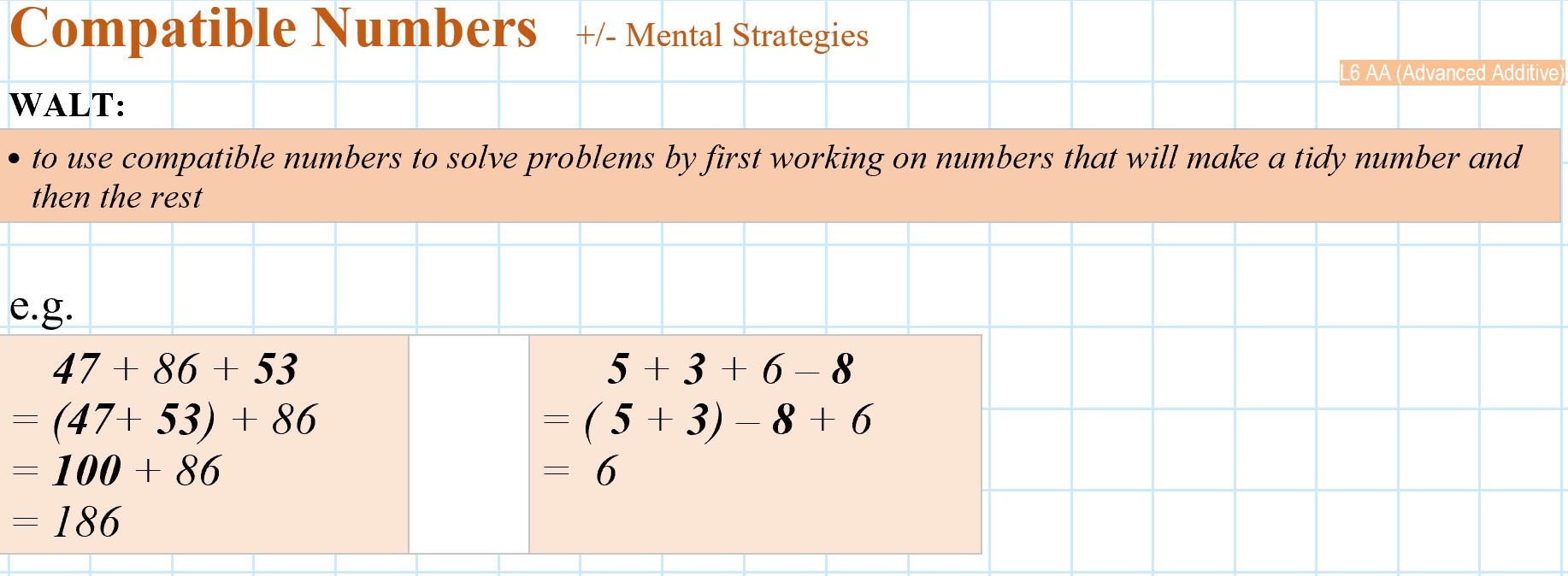
-
Context:

MHJC Learning Framework Step:
FOCUS / ARONGA learning intentions:
- We are FOCUSING... on a range of mental strategies to develop part-whole thinking skills in order to solve addition and subtraction problems.
- We are FOCUSING... on Place Value mental strategy to develop the confidence and mental skills to solve addition and subtraction problems.
- We are FOCUSING... on integers (positive and negative numbers) integers in order to solve directed numbers operations (add/subtract/multiply/divide).
Learning Intentions: We are learning to (WALT)...
- add / subtract a number by working with one place value at a time
- solve arithmetic problems following the order of operations (brackets, division, multiplication, addition/subtraction)
- solve directed number addition/subtraction/multiplication/division problems that involves positive and negative integers
- continue to practise our basic facts for accuracy and speed of recall
Success Criteria: I can/have...
- use place-value mental strategy to mentally solve addition and subtraction problems
- show the steps and working of the place-value strategy to logically explain the mathematical process to the solution
- add, subtract, multiply and divide positive and negative integers confidently and accurately
- show consistent progress or maintain the ability of basic facts' accuracy and speed of recall
Activities
- Catch up & review work on the assigned exercises from last week
- Complete the exercises assigned on Google Classroom
- Continual regular maintenance and practice of Basic Facts Practice on Ludi
- Quick 20 of Maths Starter questions as a warm-up routine
Resources:
- MHOL, external websites
- Google Classroom
- Maths Buddy
- Ludi Basic Facts
- Maths Starter
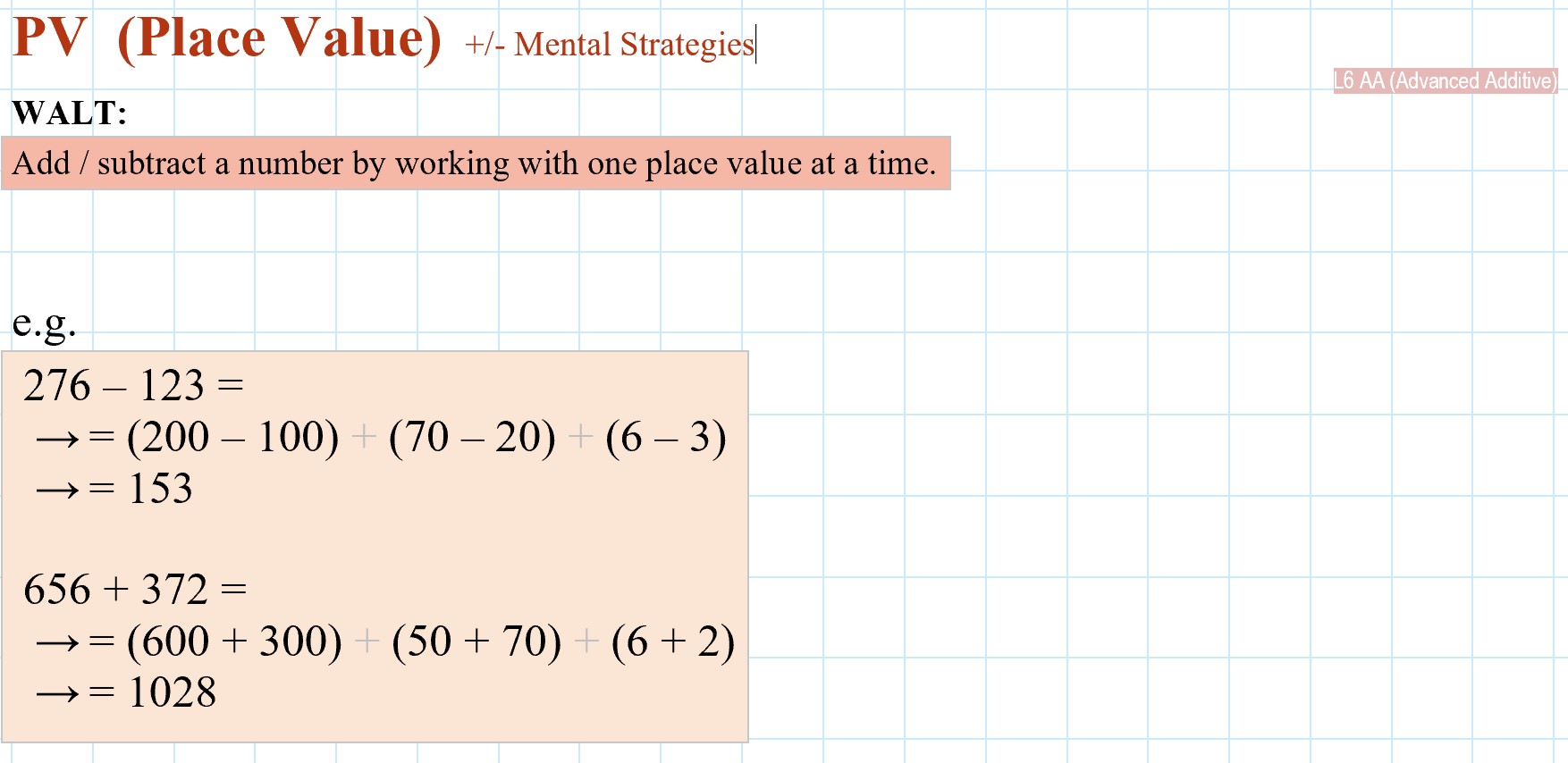
-
Context:

MHJC Learning Framework Step:
PLAN & DO / WHAKAMAHI learning intentions:
- We are PLANNING... so that we can… practise and apply the 4 mental strategies selectively to solve addition and subtraction problems.
- We are PLANNING... so that we can… demonstrate our understanding of positive and negative integers in solving directed numbers operations (add/subtract/multiply/divide).
- We are PLANNING... so that we can… perform metric unit conversion accurately in measurement.
Learning Intentions: We are learning to (WALT)...
- use a variety of mental number strategies selectively to solve addition or subtraction problems effectively
- solve arithmetic problems following the order of operations (brackets, division, multiplication, addition/subtraction)
- solve directed number addition/subtraction/multiplication/division problems that involves positive and negative integers
- continue to practise our basic facts for accuracy and speed of recall
Success Criteria: I can/have...
- selectively and effectively use one of the 4 strategies (TJ, Com#, R&C, PV) to mentally solve addition and subtraction problems
- justify the most effective mental strategy used to solve addition/subtraction problems
- show the steps and working of the place-value strategy to logically explain the mathematical process to the solution
- add, subtract, multiply and divide positive and negative integers confidently and accurately
- show consistent progress or maintain the ability of basic facts' accuracy and speed of recall
Activities
- Catch up & review work on the assigned exercises from last week
- Complete the exercises assigned on Google Classroom
- Continual regular maintenance and practice of Basic Facts Practice on Ludi
- Quick 20 of Maths Starter questions as a warm-up routine
Resources:
- MHOL, external websites
- Google Classroom
- Maths Buddy
- Ludi Basic Facts
- Maths Starter
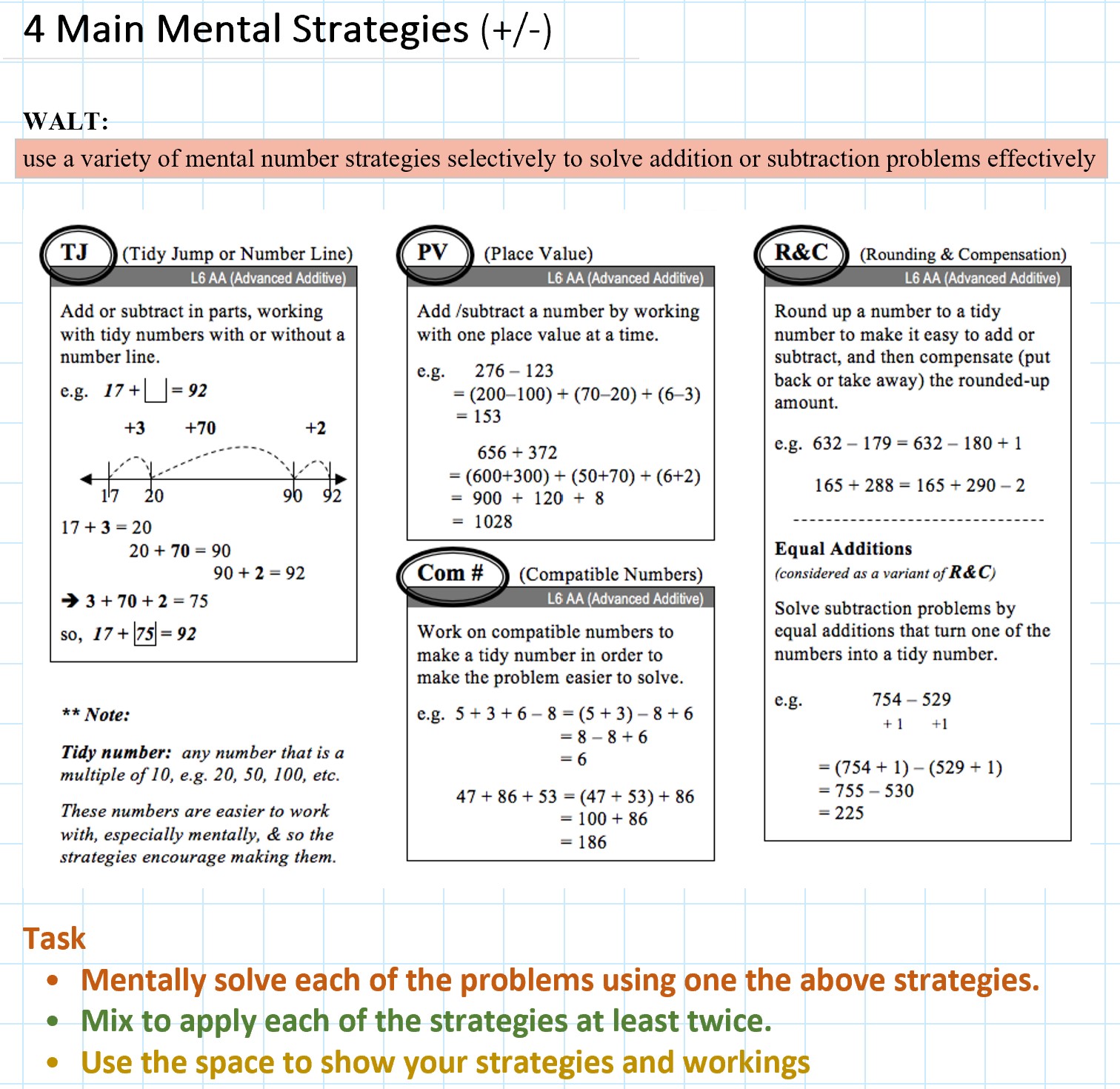
-
Context:

MHJC Learning Framework Step:
PLAN & DO / WHAKAMAHI learning intentions:
- We are PLANNING... so that we can… practise and apply the 4 mental strategies selectively to solve addition and subtraction problems.
- We are PLANNING... so that we can… demonstrate our understanding of positive and negative integers in solving directed numbers operations (add/subtract/multiply/divide).
- We are PLANNING... so that we can… perform metric unit conversion accurately in measurement.
Learning Intentions: We are learning to (WALT)...
- use a variety of mental number strategies selectively to solve addition or subtraction problems effectively
- solve arithmetic problems following the order of operations (brackets, division, multiplication, addition/subtraction)
- solve directed number addition/subtraction/multiplication/division problems that involves positive and negative integers
- continue to practise our basic facts for accuracy and speed of recall
Success Criteria: I can/have...
- selectively and effectively use one of the 4 strategies (TJ, Com#, R&C, PV) to mentally solve addition and subtraction problems
- justify the most effective mental strategy used to solve addition/subtraction problems
- show the steps and working of the place-value strategy to logically explain the mathematical process to the solution
- add, subtract, multiply and divide positive and negative integers confidently and accurately
- show consistent progress or maintain the ability of basic facts' accuracy and speed of recall
Activities
- Catch up & review work on the assigned exercises from last week
- Complete the exercises assigned on Google Classroom
- Continual regular maintenance and practice of Basic Facts Practice on Ludi
- Quick 20 of Maths Starter questions as a warm-up routine
Resources:
- MHOL, external websites
- Google Classroom
- Maths Buddy
- Ludi Basic Facts
- Maths Starter

-
Context:

MHJC Learning Framework Step:
PLAN & DO / WHAKAMAHI learning intentions:
- We are PLANNING... so that we can… perform metric unit conversion accurately in measurement.
- We are PLANNING... so that we can… publish the written form of numeral-expression with power of 10 in scientific notation.
Success Criteria: I can/have...
- convert metric units of length, weight, and volume
- convert numbers from standard form to the format of Scientific Notations using the power of 10
- show consistent progress or maintain the ability of basic facts' accuracy and speed of recall
Activities
- Catch up & review work on the assigned exercises from last week
- Complete the exercises assigned on Google Classroom
- Continual regular maintenance and practice of Basic Facts Practice on Ludi
- Quick 20 of Maths Starter questions as a warm-up routine
Resources:
- MHOL, external websites
- Google Classroom
- Maths Buddy
- Ludi Basic Facts
- Maths Starter
- BrainPop
-
Context:

MHJC Learning Framework Step:
PLAN & DO / WHAKAMAHI learning intentions:
- We are PLANNING... so that we can… perform metric unit conversion accurately in measurement.
- We are PLANNING... so that we can… publish the written form of numeral-expression with power of 10 in scientific notation.
- We are PLANNING... so that we can… present the values of scientific notation using the power of 10 in normal numeral expression.
Success Criteria: I can/have...
- convert metric units of length, weight, and volume
- convert numbers from standard form to the format of Scientific Notations using the power of 10, and vice versa
- show consistent progress or maintain the ability of basic facts' accuracy and speed of recall
Activities
- Catch up & review work on the assigned exercises from last week
- Complete the exercises assigned on Google Classroom
- Continual regular maintenance and practice of Basic Facts Practice on Ludi
- Quick 20 of Maths Starter questions as a warm-up routine
Resources:
- MHOL, external websites
- Google Classroom
- Maths Buddy
- Ludi Basic Facts
- Maths Starter
- BrainPop
-
Context:

MHJC Learning Framework Step:
REFLECT / WHAIWHAKAARO learning intentions:
- We are REFLECTING… evaluate if there are still gaps in metric unit conversion in measurement.
- We are REFLECTING… evaluate if there are still gaps in expressing numerals in power of 10
Success Criteria: I can/have...
- convert metric units of length, weight, and volume
- convert numbers from standard form to the format of Scientific Notations using the power of 10, and vice versa
- show consistent progress or maintain the ability of basic facts' accuracy and speed of recall
Activities
- Catch up & review work on the assigned exercises from last week
- Complete the exercises assigned on Google Classroom
- Continual regular maintenance and practice of Basic Facts Practice on Ludi
- Quick 20 of Maths Starter questions as a warm-up routine
- Revision tasks
Resources:
- MHOL, external websites
- Google Classroom
- Maths Buddy
- Ludi Basic Facts
- Maths Starter
- BrainPop
-
Context:

MHJC Learning Framework Step:
REFLECT / WHAIWHAKAARO learning intentions:
- We are REFLECTING… assess out progress of our learning journey with addition and subtraction mental strategies.
- We are REFLECTING… review our understanding of integers in directed number operations.
- We are REFLECTING… evaluate if there are still gaps in metric unit conversion in measurement.
- We are REFLECTING… evaluate if there are still gaps in expressing numerals in power of 10
Success Criteria: I can/have...
- selectively and effectively use one of the 4 strategies (TJ, Com#, R&C, PV) to mentally solve addition and subtraction problems
- justify the most effective mental strategy used to solve addition/subtraction problems
- show the steps and working of the place-value strategy to logically explain the mathematical process to the solution
- add, subtract, multiply and divide positive and negative integers confidently and accurately
- convert metric units of length, weight, and volume
- convert numbers from standard form to the format of Scientific Notations using the power of 10, and vice versa
- show consistent progress or maintain the ability of basic facts' accuracy and speed of recall
Activities
- Catch up & review work on the assigned exercises from last week
- Complete the exercises assigned on Google Classroom
- Continual regular maintenance and practice of Basic Facts Practice on Ludi
- Quick 20 of Maths Starter questions as a warm-up routine
- Revision tasks
- Assessment
Resources:
- MHOL, external websites
- Google Classroom
- Maths Buddy
- Ludi Basic Facts
- Maths Starter
- BrainPop
-
Context:

MHJC Learning Framework Step:
EXPLORE / TŪHURA learning intentions:
- We are EXPLORING… to conceptualise a range of mental strategies to solve multiplication and division problems.
Success Criteria: I can/have...
- observe the importance times table facts being the important foundation for multiplication strategies
- show the ability to recall times table facts with accuracy and speed
Activities
- Catch up & review work on the assigned exercises from last term
- Explore Term 3 context and establish meaningful links to the possible concepts in Maths
- Complete the exercises assigned on Google Classroom, Maths Buddy, and/or BraindPop
- Continual regular maintenance and practice of Basic Facts Practice on Ludi
- Quick 20 of Maths Starter questions as a warm-up routine
Resources:
- MHOL, external websites
- Google Classroom
- Maths Buddy
- Ludi Basic Facts
- Maths Starter
- BrainPop
-
Context:

MHJC Learning Framework Step:
EXPLORE / TŪHURA learning intentions:
- We are EXPLORING… to conceptualise a range of working strategies to solve problems with fractions.
Success Criteria: I can/have...
- explore the basic concepts of fractions
- make meaningful connections of fractions to real world applications and situations
Activities
- Catch up & review work on the assigned exercises from last week
- Complete the exercises assigned on Google Classroom, Maths Buddy, and/or BraindPop
- Continual regular maintenance and practice of Basic Facts Practice on Ludi
- Quick 20 of Maths Starter questions as a warm-up routine
Resources:
- MHOL, external websites
- Google Classroom
- Maths Buddy
- Ludi Basic Facts
- Maths Starter
- BrainPop
-
Context:

MHJC Learning Framework Step:
FOCUS / ARONGA learning intentions:
- We are FOCUSING… use a range of mental strategies to develop part-whole thinking skills in order to solve multiplication and division problems.
Success Criteria: I can/have...
- identify a range of multiplication mental strategies
- continue to work on the speed and accuracy of recall for times table facts
Activities
- Assessment task (catch-up) from Term 2
- Catch up & review work on the assigned exercises from last week
- Complete the exercises assigned on Google Classroom, Maths Buddy, and/or BraindPop
- Continual regular maintenance and practice of Basic Facts Practice on Ludi
- Quick 20 of Maths Starter questions as a warm-up routine
Resources:
- MHOL, external websites
- Google Classroom
- Maths Buddy
- Ludi Basic Facts
- Maths Starter
- BrainPop
-
Context:

MHJC Learning Framework Step:
FOCUS / ARONGA learning intentions:
- We are FOCUSING… use rounding & compensation mental strategy to develop the confidence and mental skills to solve multiplication problems.
Success Criteria: I can/have...
round up a number to a tidy number to make it easy to multiply, and then compensate (adjust or take away) the rounded-up amount
Activities
- Catch up & review work on the assigned exercises from last week
- Complete the exercises assigned on Google Classroom, Maths Buddy, and/or BraindPop
- Continual regular maintenance and practice of Basic Facts Practice on Ludi
- Quick 20 of Maths Starter questions as a warm-up routine
Resources:
- MHOL, external websites
- Google Classroom
- Maths Buddy
- Ludi Basic Facts
- Maths Starter
- BrainPop
-
Context:

MHJC Learning Framework Step:
FOCUS / ARONGA learning intentions:
- We are FOCUSING… use cut-and-paste (aka factorisation) mental strategy to develop the confidence and mental skills to solve multiplication problems.
- We are FOCUSING… use place value mental strategy to develop the confidence and mental skills to solve multiplication problems.
Success Criteria: I can/have...
-
(Cut & Paste) Factorise the number/s (i.e. what times what equals to that number) using doubling, halving, tripling, thirding, or other times-table facts, and then multiply the numbers that will make a tidy number, which makes it easier to solve the multiplication problem.
-
(Place Value) Use place-value partitioning, meaning to multiply a number by working with each place value separately and then put them together.
Activities
- Catch up & review work on the assigned exercises from last week
- Complete the exercises assigned on Google Classroom, Maths Buddy, and/or BraindPop
- Continual regular maintenance and practice of Basic Facts Practice on Ludi
- Quick 20 of Maths Starter questions as a warm-up routine
Resources:
- MHOL, external websites
- Google Classroom
- Maths Buddy
- Ludi Basic Facts
- Maths Starter
- BrainPop
-
Context:

MHJC Learning Framework Step:
PLAN & DO / WHAKAMAHI learning intentions:
- We are PLANNING... so that we can… practise and apply the 3 mental strategies selectively to solve multiplication problems.
- We are PLANNING... so that we can… practise and apply the algorithm (column method) to solve multiplication problems with whole numbers and decimals.
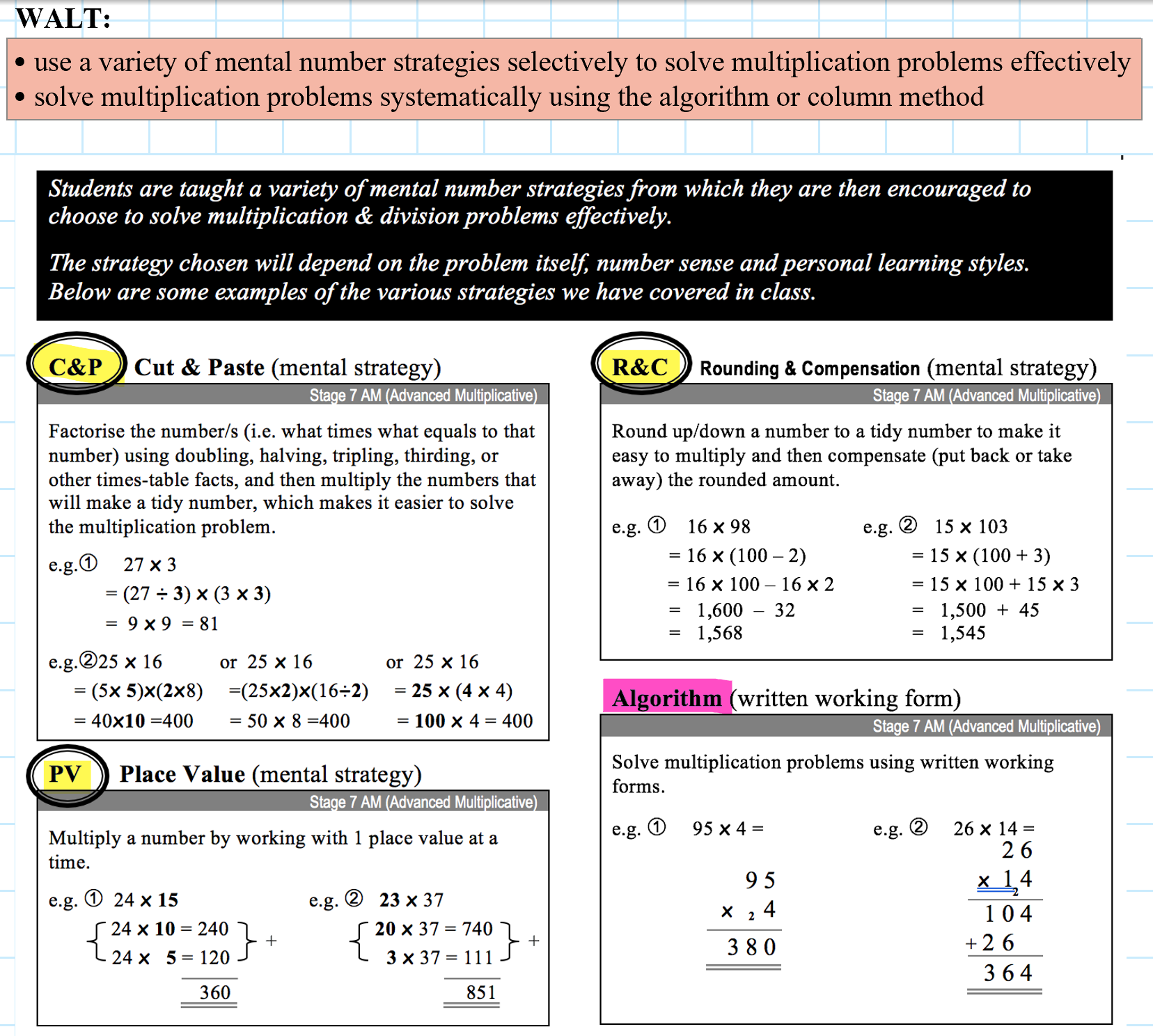
Success Criteria: I can/have...
- selectively and effectively use one of the 3 strategies (Rounding & Compensation, Cut & Paste, Plave Value) to mentally solve multiplication problems
- (continue to practise) the 3 mental strategies to develop confidence for all of them
- use the column method (algorithm working form) to systematically solve multiplication problems
- make connection between algorithm method and the Place Value mental strategy
Activities
- Catch up & review work on the assigned exercises from last week
- Complete the exercises assigned on Google Classroom, Maths Buddy, and/or BraindPop
- Continual regular maintenance and practice of Basic Facts Practice on Ludi
- Quick 20 of Maths Starter questions as a warm-up routine
Resources:
- MHOL, external websites
- Google Classroom
- Maths Buddy
- Ludi Basic Facts
- Maths Starter
- BrainPop
-
Context:

MHJC Learning Framework Step:
FOCUS / ARONGA learning intentions:
- We are FOCUSING… on using place-value partitioning (chunking) mental strategy to develop the confidence and mental skills to solve division problems.
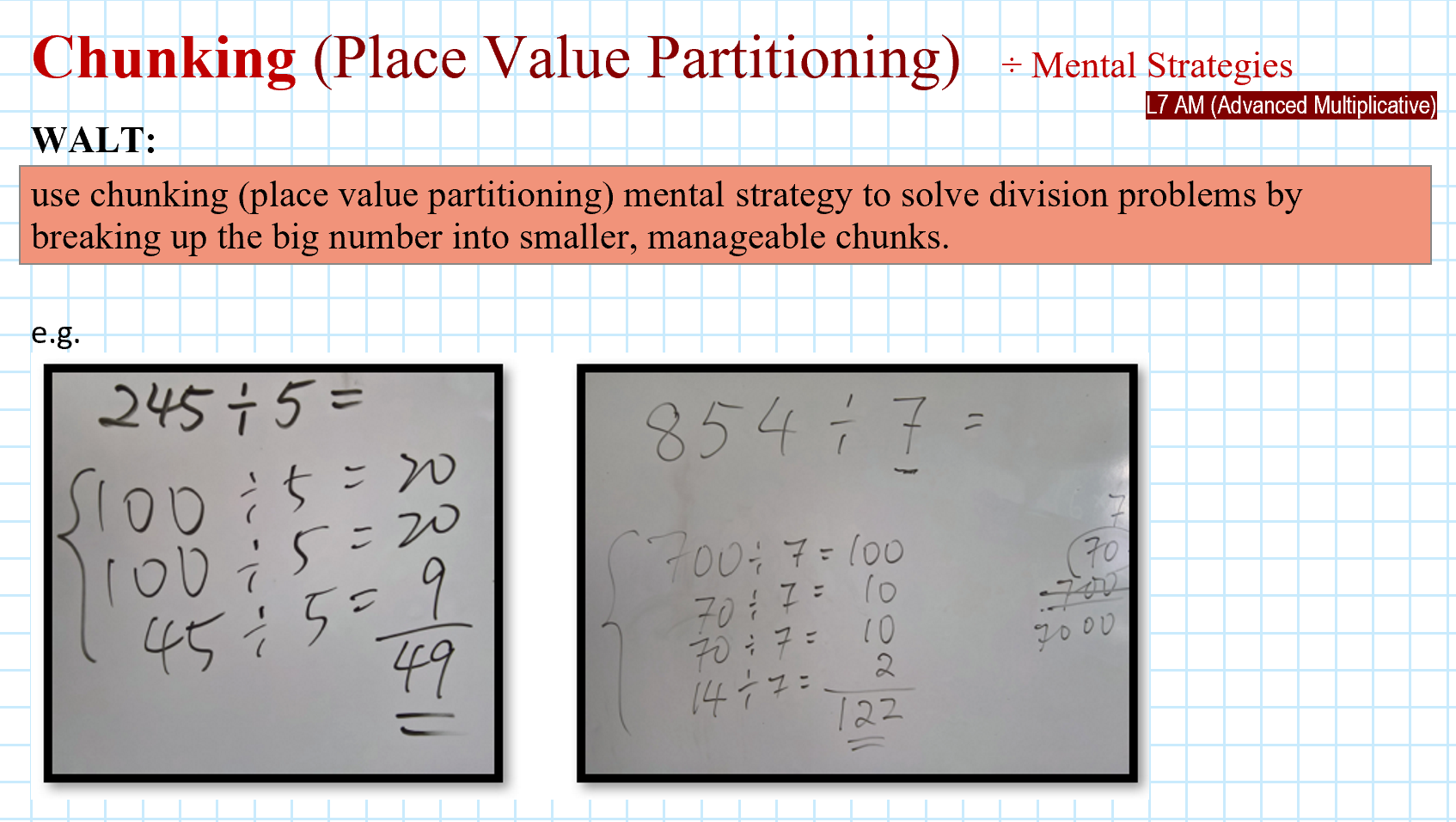
Success Criteria: I can/have...
- use "chunking" (place value partitioning) mental strategy to solve division problems by breaking up the big number into smaller, manageable chunks
- make meaningful connection between multiplication and division
- identify the practical use of division in real-life scenarios
Activities
- Catch up & review work on the assigned exercises from last week
- Complete the exercises assigned on Google Classroom, Maths Buddy, and/or BraindPop
- Continual regular maintenance and practice of Basic Facts Practice on Ludi
- Quick 20 of Maths Starter questions as a warm-up routine
Resources:
- MHOL, external websites
- Google Classroom
- Maths Buddy
- Ludi Basic Facts
- Maths Starter
- BrainPop
-
Context:

MHJC Learning Framework Step:
PLAN & DO / WHAKAMAHI learning intentions:
- We are PLANNING... so that we can… practise and apply the algorithm (column method) to solve division problems with long and/or short division method.
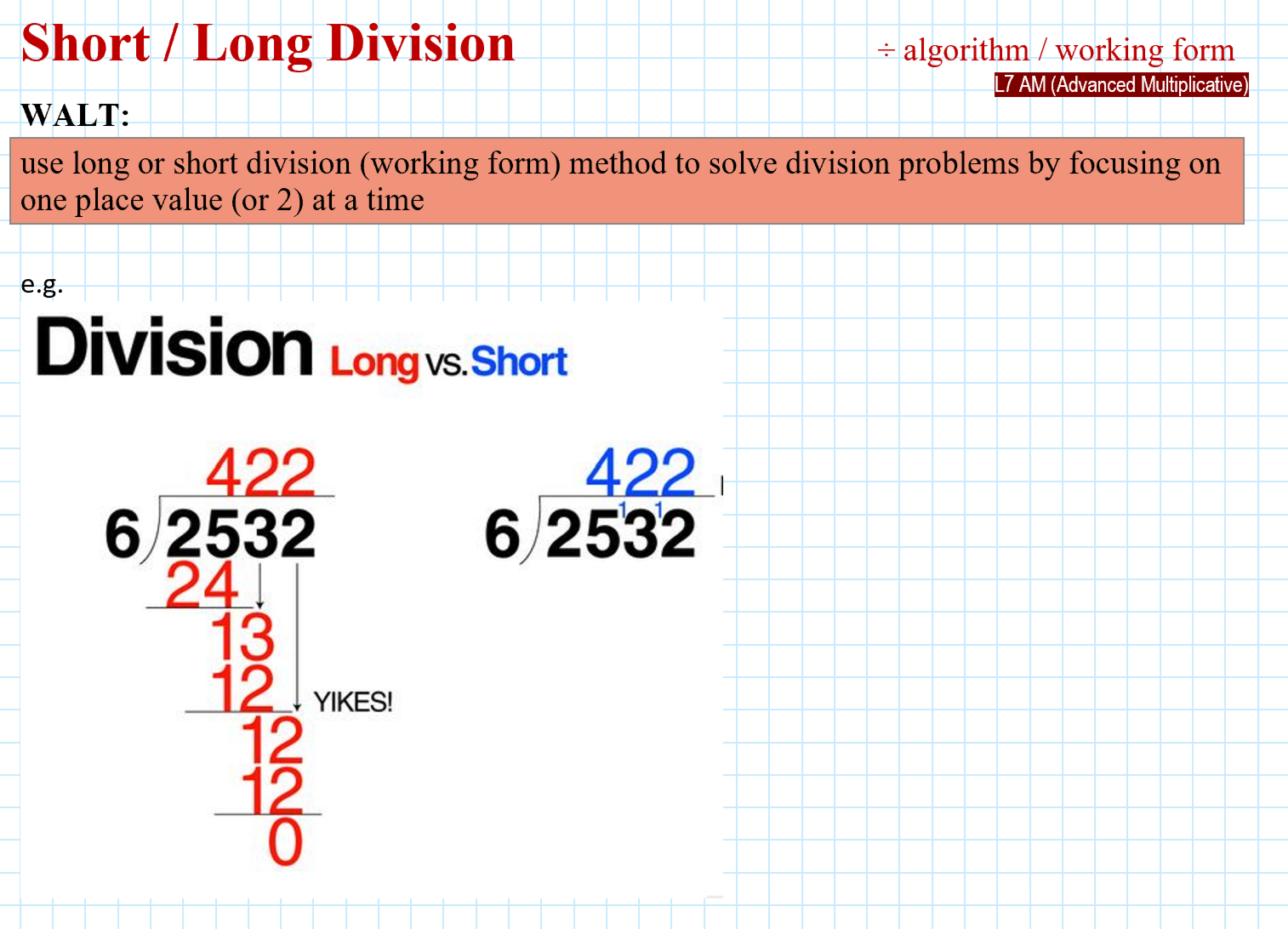
Success Criteria: I can/have...
- use long or short division (working form) method to solve division problems by focusing on one place value (or 2) at a time
- make meaningful connection between multiplication and division
- identify the practical use of division in real-life scenarios
Activities
- Catch up & review work on the assigned exercises from last week
- Complete the exercises assigned on Google Classroom, Maths Buddy, and/or BraindPop
- Continual regular maintenance and practice of Basic Facts Practice on Ludi
- Quick 20 of Maths Starter questions as a warm-up routine
Resources:
- MHOL, external websites
- Google Classroom
- Maths Buddy
- Ludi Basic Facts
- Maths Starter
- BrainPop
-
Context:

MHJC Learning Framework Step:
REFLECT / WHAIWHAKAARO learning intentions:
- We are REFLECTING… assess out progress of our learning journey with multiplication mental strategies as well as algorithm (column method).
Success Criteria: I can/have...
- selectively and effectively use one of the 3 strategies (Rounding & Compensation, Cut & Paste, Plave Value) to mentally solve multiplication problems
- use the column method (algorithm working form) to systematically solve multiplication problems
- apply these multiplication strategies in solving word problems
Activities
- Catch up & revise all multiplication strategies covered this term
- Complete the exercises assigned on Google Classroom, Maths Buddy, and/or BraindPop
- Continual regular maintenance and practice of Basic Facts Practice on Ludi
- Quick 20 of Maths Starter questions as a warm-up routine
Resources:
- MHOL, external websites
- Google Classroom
- Maths Buddy
- Ludi Basic Facts
- Maths Starter
- BrainPop
-
Context:

MHJC Learning Framework Step:
REFLECT / WHAIWHAKAARO learning intentions:
- We are REFLECTING… assess out progress of our learning journey with division mental strategies as well as long/short division method.
Success Criteria: I can/have...
- use long or short division (working form) method to solve division problems by focusing on one place value (or 2) at a time
- apply division strategies to solve word problems
Activities
- Catch up & revise all division strategies covered this term
- Complete the exercises assigned on Google Classroom, Maths Buddy, and/or BraindPop
- Continual regular maintenance and practice of Basic Facts Practice on Ludi
- Quick 20 of Maths Starter questions as a warm-up routine
Resources:
- MHOL, external websites
- Google Classroom
- Maths Buddy
- Ludi Basic Facts
- Maths Starter
- BrainPop
-
Context:

MHJC Learning Framework Step:
EXPLORE / TŪHURA learning intentions:
- We are EXPLORING… to conceptualise a range of working strategies to solve problems with fractions.
Success Criteria: I can/have...
- verbally and visually define fractions as a part of whole
- identify the types of fractions in expressed in objects, images, and mathematical expressions
- compare the value of unit fractions
- explain the meaning and implications of the numerator and denominator in a fraction
Activities
- Catch up & review work on the assigned exercises from last week
- Complete the exercises assigned on Google Classroom, Maths Buddy, Transum and/or BraindPop
- Continual regular maintenance and practice of Basic Facts Practice on Ludi
- Quick 20 of Maths Starter questions as a warm-up routine
Resources:
- MHOL, external websites
- Google Classroom
- Maths Buddy
- Ludi Basic Facts
- Maths Starter
- BrainPop
- Transum
-
Context:

MHJC Learning Framework Step:
FOCUS / ARONGA learning intentions:
- We are FOCUSING... identify equivalent fractions and adjust with times table facts to reduce or simplify fractions.
- We are FOCUSING... develop the concept of improper fractions so that we can compare them with mixed numbers and convert improper fractions to mixed numbers, and vice versa.
- We are FOCUSING... develop of the concept of LCM (lowest common multiple/denominator) so that we can identify the LCM between 2 or more numbers.
Success Criteria: I can/have...
- use multiplication and division facts (i.e. times table facts) to simplify fractions, showing good understanding of equivalent fractions
- use multiplication or repeated addition (with the concept of whole/s) to convert improper fractions to mixed numbers, and vice versa.
- identify common multiples between two more more numbers
- find the LCM of two or more numbers (i.e. fractions of different denominators)
Activities
- Catch up & review work on the assigned exercises from last week
- Complete the exercises assigned on Google Classroom, Maths Buddy, Transum and/or BraindPop
- Continual regular maintenance and practice of Basic Facts Practice on Ludi
- Quick 20 of Maths Starter questions as a warm-up routine
Resources:
- MHOL, external websites
- Google Classroom
- Maths Buddy
- Ludi Basic Facts
- Maths Starter
- BrainPop
- Transum
-
Context:

ASB Workshop Financial Literacy
MHJC Learning Framework Step:
FOCUS / ARONGA learning intentions:
- We are FOCUSING... identify equivalent fractions and adjust with times table facts to reduce or simplify fractions.
- We are FOCUSING... develop the concept of improper fractions so that we can compare them with mixed numbers and convert improper fractions to mixed numbers, and vice versa.
- We are FOCUSING... develop of the concept of LCM (lowest common multiple/denominator) so that we can identify the LCM between 2 or more numbers.
Success Criteria: I can/have...
- use multiplication and division facts (i.e. times table facts) to simplify fractions, showing good understanding of equivalent fractions
- use multiplication or repeated addition (with the concept of whole/s) to convert improper fractions to mixed numbers, and vice versa.
- identify common multiples between two more more numbers
- find the LCM of two or more numbers (i.e. fractions of different denominators)
Activities
- Catch up & review work on the assigned exercises from last week
- Complete the exercises assigned on Google Classroom, Maths Buddy, Transum and/or BraindPop
- Continual regular maintenance and practice of Basic Facts Practice on Ludi
- Quick 20 of Maths Starter questions as a warm-up routine
Resources:
- MHOL, external websites
- Google Classroom
- Maths Buddy
- Ludi Basic Facts
- Maths Starter
- BrainPop
- Transum
-
Context:

ASB Workshop Financial Literacy
MHJC Learning Framework Step:
FOCUS / ARONGA learning intentions:
- We are FOCUSING... identify equivalent fractions and adjust with times table facts to reduce or simplify fractions.
- We are FOCUSING... develop the concept of improper fractions so that we can compare them with mixed numbers and convert improper fractions to mixed numbers, and vice versa.
- We are FOCUSING... develop of the concept of LCM (lowest common multiple/denominator) so that we can identify the LCM between 2 or more numbers.
Success Criteria: I can/have...
- use multiplication and division facts (i.e. times table facts) to simplify fractions, showing good understanding of equivalent fractions
- use multiplication or repeated addition (with the concept of whole/s) to convert improper fractions to mixed numbers, and vice versa.
- identify common multiples between two more more numbers
- find the LCM of two or more numbers (i.e. fractions of different denominators)
Activities
- Catch up & review work on the assigned exercises from last week
- Complete the exercises assigned on Google Classroom, Maths Buddy, Transum and/or BraindPop
- Continual regular maintenance and practice of Basic Facts Practice on Ludi
- Quick 20 of Maths Starter questions as a warm-up routine
Resources:
- MHOL, external websites
- Google Classroom
- Maths Buddy
- Ludi Basic Facts
- Maths Starter
- BrainPop
- Transum
-
Context:

MHJC Learning Framework Step:
PLAN & DO / WHAKAMAHI learning intentions:
- We are PLANNING... so that we can… practise and apply working strategies to solve addition / subtraction problems of fractions with different denomintors.
Success Criteria: I can/have...
- add and subtract a range of fractions (same denominators, different denomintors)
- add and subtract fractions that involve mixed numbers
Activities
- Catch up & review work on the assigned exercises from last week
- Complete the exercises assigned on Google Classroom, Maths Buddy, Transum and/or BraindPop
- Continual regular maintenance and practice of Basic Facts Practice on Ludi
- Quick 20 of Maths Starter questions as a warm-up routine
Resources:
- MHOL, external websites
- Google Classroom
- Maths Buddy
- Ludi Basic Facts
- Maths Starter
- BrainPop
- Transum
-
Context:

MHJC Learning Framework Step:
PLAN & DO / WHAKAMAHI learning intentions:
- We are PLANNING... so that we can… practise and apply working strategies to solve addition / subtraction problems of fractions with different denomintors.
- We are PLANNING... so that we can… demonstrate our understanding of fraction decimals & percentages in solving number problems.
Success Criteria: I can/have...
- add and subtract a range of fractions (same denominators, different denominators)
- add and subtract fractions that involve mixed numbers
- find the fractional value of a number or a group
Activities
- Catch up & review work on the assigned exercises from last week
- Complete the exercises assigned on Google Classroom, Maths Buddy, Transum and/or BraindPop
- Continual regular maintenance and practice of Basic Facts Practice on Ludi
- Quick 20 of Maths Starter questions as a warm-up routine
Resources:
- MHOL, external websites
- Google Classroom
- Maths Buddy
- Ludi Basic Facts
- Maths Starter
- BrainPop
- Transum
-
Context:

MHJC Learning Framework Step:
PLAN & DO / WHAKAMAHI learning intentions:
- We are PLANNING... so that we can… practise and apply working strategies to solve addition / subtraction problems of fractions with different denominators.
- We are PLANNING... so that we can… demonstrate our understanding of fraction decimals & percentages in solving number problems.
Success Criteria: I can/have...
- add and subtract a range of fractions (same denominators, different denominators)
- add and subtract fractions that involve mixed numbers
- find the fractional value of a number or a group
Activities
- Catch up & review work on the assigned exercises from last week
- Complete the exercises assigned on Google Classroom, Maths Buddy, Transum and/or BraindPop
- Continual regular maintenance and practice of Basic Facts Practice on Ludi
- Quick 20 of Maths Starter questions as a warm-up routine
Resources:
- MHOL, external websites
- Google Classroom
- Maths Buddy
- Ludi Basic Facts
- Maths Starter
- BrainPop
- Transum
- Prodigy
-
Context:

MHJC Learning Framework Step:
PLAN & DO / WHAKAMAHI learning intentions:
- We are PLANNING... so that we can… practise and apply working strategies to solve addition / subtraction problems of fractions with different denominators.
- We are PLANNING... so that we can… demonstrate our understanding of fraction decimals & percentages in solving number problems.
Success Criteria: I can/have...
- add and subtract a range of fractions (same denominators, different denominators)
- add and subtract fractions that involve mixed numbers
- find the fractional value of a number or a group
Activities
- Catch up & review work on the assigned exercises from last week
- Complete the exercises assigned on Google Classroom, Maths Buddy, Transum and/or BraindPop
- Continual regular maintenance and practice of Basic Facts Practice on Ludi
- Quick 20 of Maths Starter questions as a warm-up routine
Resources:
- MHOL, external websites
- Google Classroom
- Maths Buddy
- Ludi Basic Facts
- Maths Starter
- BrainPop
- Transum
- Prodigy

